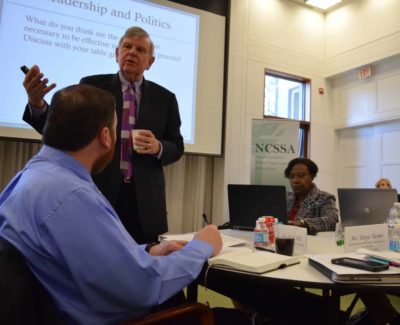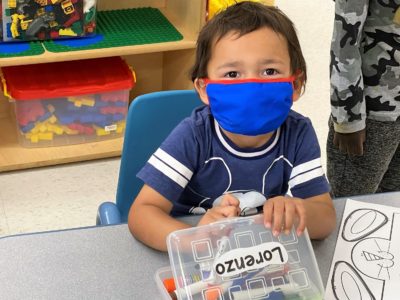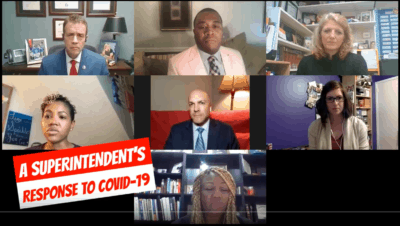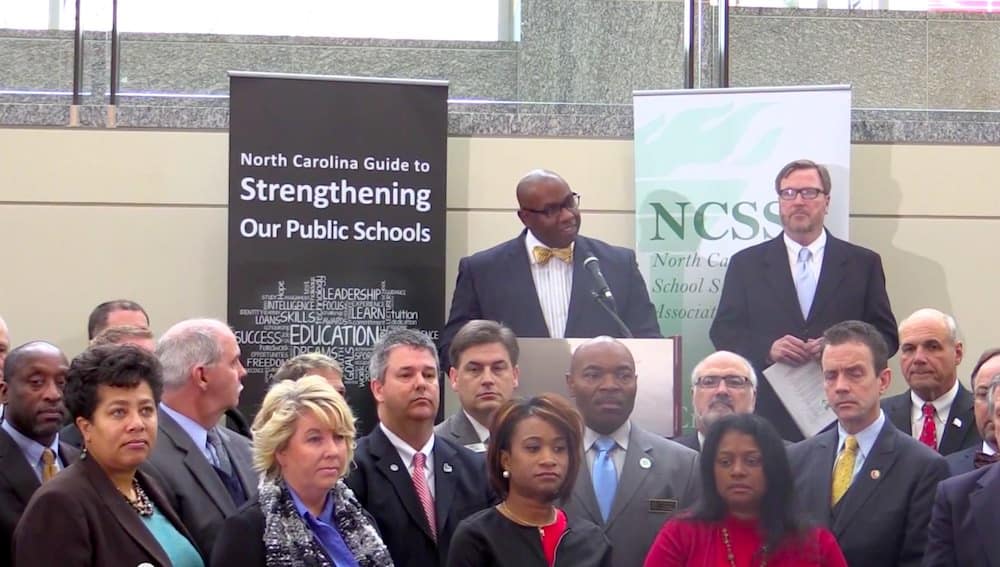

|
|
The school superintendency is one of the most challenging, but also can be one of the most rewarding positions in education. This school year, nearly a quarter of all North Carolina school districts will be led by a superintendent with a year or less of experience.
Recent changes in the education landscape have made school superintendency difficult. Nationwide, the turnover for superintendents is trending upward, and North Carolina’s superintendent turnover mirrors the nation’s. The superintendent must balance intense and often competing pressures including an ever-changing legislative landscape, reduction in the teacher pipeline, and the challenges and perils of operating schools during a pandemic.
Amid these challenges, however, there is one shining star that guides education leadership in the state. Meet the North Carolina School Superintendents’ Association (NCSSA), whose mission is to provide support to the state’s educational leaders through professional development, legislative advocacy, legal consulting, and a wealth of networking opportunities.
Three dynamic leaders
We at the North Carolina Science, Mathematics, and Technology Education Center (NCSMT) sat down with three representatives from this dynamic group, each with a unique perspective, to better understand NCSSA’s vision, how it supports its members, and how it has been affected by (and adapted with aplomb to) the teaching challenges presented by the pandemic.
Jack Hoke has been the NCSSA’s executive director for nine years after serving for 12 as the superintendent of Alexander County Schools. He also served as principal for elementary, middle, and high schools in Caldwell County and in school administration for 32 years. He has worked as an adviser to the State Board of Education and was appointed by then-Gov. Bev Perdue to serve on the Professional Teaching Standards Commission from 2006 to 2010. Now, it is Hoke’s goal to inspire new and sitting superintendents and to ensure they have the tools, support, and contacts to find success and purpose in their work.
Rob Jackson is a North Carolina native and proud graduate of its public schools. During his career, Jackson has served in every capacity from teacher to high school principal, bus driver to chief communications officer. He has served as superintendent for both the Carteret County Public School System and the Edenton-Chowan School System. While at the latter, he saw the school system’s cohort graduation rate rise from 78.9% to 93% in just six years. And, as a clear indicator of his desire to see those he supports succeed, many educators in his district received leadership and teaching honors during his tenure. Jackson is also a mentor in the NCSSA Aspiring Superintendents Program.
Eisa Cox is a recent graduate of the NCSSA Aspiring Superintendents Program and the current superintendent of Ashe County Schools, where she has risen to the challenge of educating during the pandemic by initiating some groundbreaking programs. Cox has served as a science teacher, an assistant principal, and as executive director of programs for Rowan-Salisbury School System. During that role, Cox was awarded a $26.4 million 2020 U.S. Department of Education grant for “Accelerated Rowan,” obtained over $350k in grants to support career coaching, and saw scholarships increase from $5.8 million to over $32 million in five years.
“You can easily get caught up in the day to day,” said Cox, “But through the education and professional development we receive, we get back to the real priorities of the role: creating a vision for your district, talking through best practices, managing board/superintendent relationships, creatively using all our human resources, and of course critical teaching and learning.”
Jackson concurs. “Novice superintendents are literally learning the job on the job! Having an executive coach, elbow to elbow, to guide and help answer questions and bounce things off is just awesome,” he said.
Has the group kept up with the pressures and challenges of COVID in the classroom? Yes. Even with COVID-19 restrictions, NCSSA was able to hold half-day leadership development programs and a full day on technical skills for the Next Generation leaders. The Aspiring Superintendents, meanwhile, completed six sessions, executive coaching sessions, weekly check-ins, and both a summer and winter leadership conference.
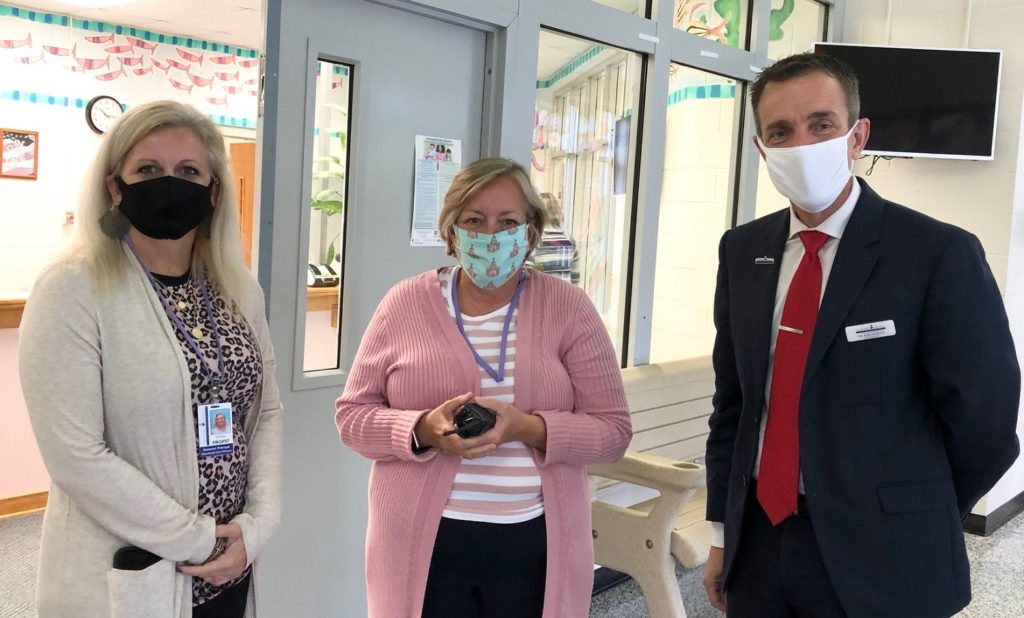

Benefits of the Aspiring Superintendent Program
The Aspiring Superintendent Program is a partnership between NCSMT and the NC Alliance for School Leadership Development (NCASLD) that annually provides 30 central office staff members the chance to learn skills to become a superintendent. Though some of the mechanics of the program have been augmented to manage the challenges of the pandemic, training typically includes 12 hours of leadership development, 12 hours of technical skills, and six hours with a “Thought Partner” (a sitting superintendent) over six days.
The program has several driving features:
Focus on best practices: These sessions always include speakers not only from North Carolina (who can speak to local legislation or nuances specific to the region), but professionals from across the country who can share a totally different perspective. These forums are interactive, engaging, and critical to uncovering and embracing the very best practices from the most innovative and experienced leaders.
Develop sought-after skills that apply to all fields: While this program is crafted to support aspiring superintendents, the lessons learned will drive success in any discipline. Attendees are prepared to be better leaders, which can mean “being a superintendent,” but also someone who could support a superintendent or simply be a better employee, spouse, parent, or person.
Ongoing mentorship: Each attendee receives weekly check-ins with a thought partner (a current superintendent), biweekly meetings with their executive coach (a retired superintendent), an invitation to continuing leadership conferences twice yearly, as well as the ability to call or text one of these mentors when a challenge arises.
“Having both a thought partner and an executive coach who have lived the position and can provide an unbiased opinion isn’t something that’s always available — and it’s absolutely critical,” said Cox.
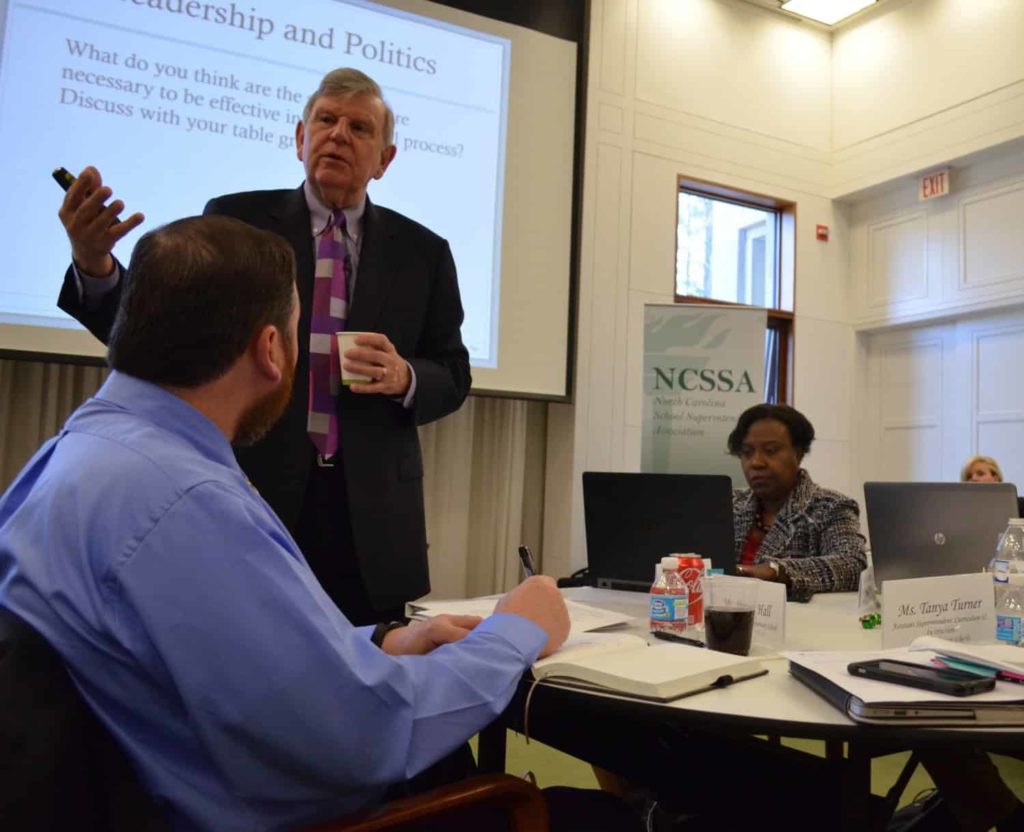

Thoughtful relationship-building: While Hoke seeks to provide a “bigger world” and new experiences to participants, he also excels (according to his graduates) at making matches between participant and mentor. He notes that it’s easier for mentors to empathize with those they are guiding if they come from similar experiences.
Unparalleled networking: One strategy highlighted by all three is taking full advantage of networking opportunities. “During COVID, Jack pivoted to a digital platform, allowing the group to stay connected. Those connections have allowed me as a novice superintendent to reach out to others across the state who may have the same challenges as I have,” said Cox.
Cox described this past year as learning to teach “different and together” and noted a few of the COVID-inspired approaches she brought back to her district:
A focus on continuing education. Professional development actually experienced an uptick during the pandemic because teachers didn’t have to travel to learn. And, coursework became more customized, giving teachers everything they needed, custom cut for their specific challenges and circumstances.
Zooming to bring teachers together. Zoom meetings may have their pitfalls, but they can bring large groups from across the state together to plan, learn, and share best practices in ways that a teachers’ lounge can’t.
Re-engaging students. Hybrid learning presents lots of challenges but it also provided teachers ways to engage students. Sending home hands-on activities to be done with parents so “learning can take place wherever students are” and spinning off into small discussion groups, are non-traditional ways hybrid learning can be applied and honed when kids are back in the classroom.
Whether or not you become a superintendent, this program provides both the technical skills sessions and shared space for peers and mentors to help participants get to know their own leadership style and grow as a leader.
Next generation development
Since COVID-19 and its necessary protocols were on everyone’s mind even as mask mandates fell and vaccinations increased, Jackson said that the pandemic introduced its own pitfalls and workarounds. But “every year there’s a new challenge,” he said.
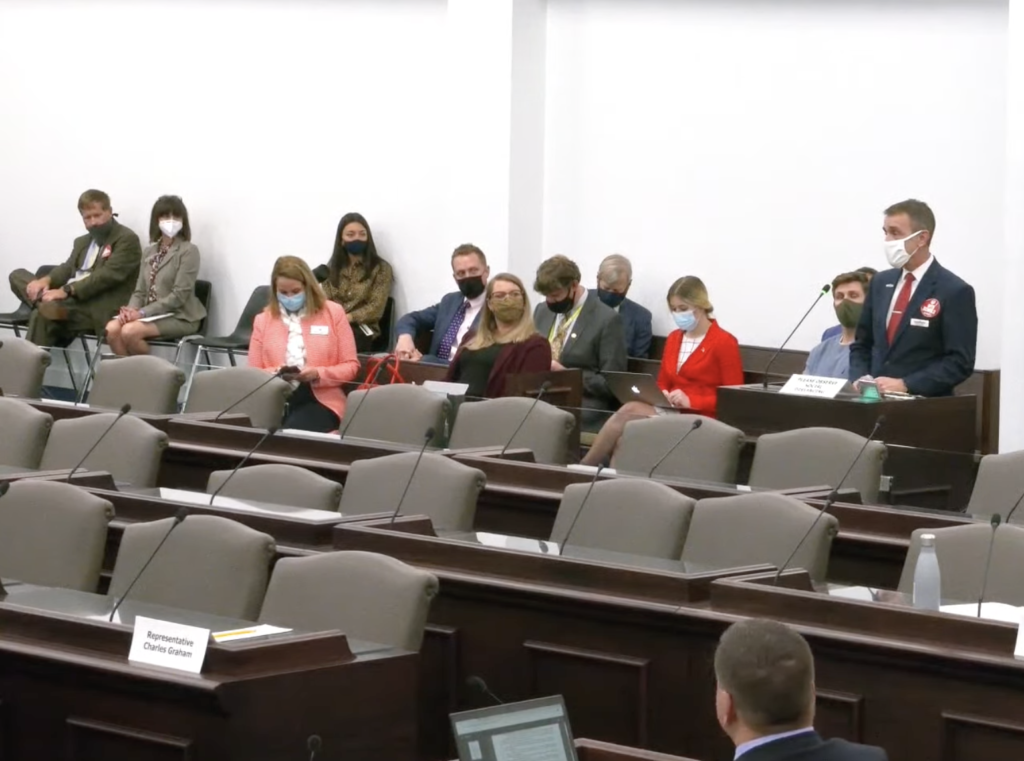

One of the values of the Next Generation Superintendent program is that it provides future leaders with the tools, experience, and contacts to tackle any new hurdles. The program ensures that highly effective superintendents are skilled in the following:
- Superintendent/School Board Relations. The superintendent must establish a cooperative, productive relationship with the Board. The primary job of the Board is to develop policy, and the primary job of the superintendent is to administer an educational program.
- Visioning and Goal-setting. With involvement of a representative group of education stakeholders, the superintendent and the staff must facilitate the development of a vision reflecting the preparation of students for their lives after they complete their secondary education. To the extent possible, this vision should describe an “ideal” future considering changes in science, technology, the environment, and the uniqueness of each community served by the school district.
- Leading for Improved Teaching and Learning. One of the best ways for a school superintendent to fulfill the responsibility for leading for improved teaching and learning is to delegate and empower principals, curricular and instructional specialists, and teachers to share the role of instructional leader.
- Human Resource (HR) Leadership. An absolutely critical attribute that determines the success of a school superintendent is solid HR leadership, specifically identification, recruitment and employment of outstanding, conscientious employees. This not only improves the performance of the district, it goes a long way in reducing the superintendent’s management problems so that time and energy can be devoted to leadership activities.
- Systems Leadership. As the leader of a district, the superintendent must assign top priority to establishing a school culture that is student-centered, operate and make decisions based on the highest principles, and be caring and understanding in dealing with employees. The superintendent must believe, and demonstrate with action, that the ultimate measure of one’s leadership ability is to share or transfer power. The superintendent, especially, needs to empower the leadership team, including principals and central office staff, to carry out their functions in an independent and responsible manner consistent with district goals.
Jackson points to networking opportunities as a prime benefit of this program. Participants have access to great minds and mentors with a variety of experiences, backgrounds, and perspectives. Those who work hard to sustain these networks, tend to be better prepared, more connected, and armed with tools to survive new challenges, said Jackson.
“To see graduates of the program (like Dr. Cox) not only become superintendents but to sustain their involvement in leadership is truly a blessing,” Jackson said. “There’s great pride in our graduates because they do continue to serve — and they serve so successfully.”
Editor’s note: This piece was originally published by the North Carolina Science, Mathematics, and Technology Education Center. It has been republished here with the author’s permission.



